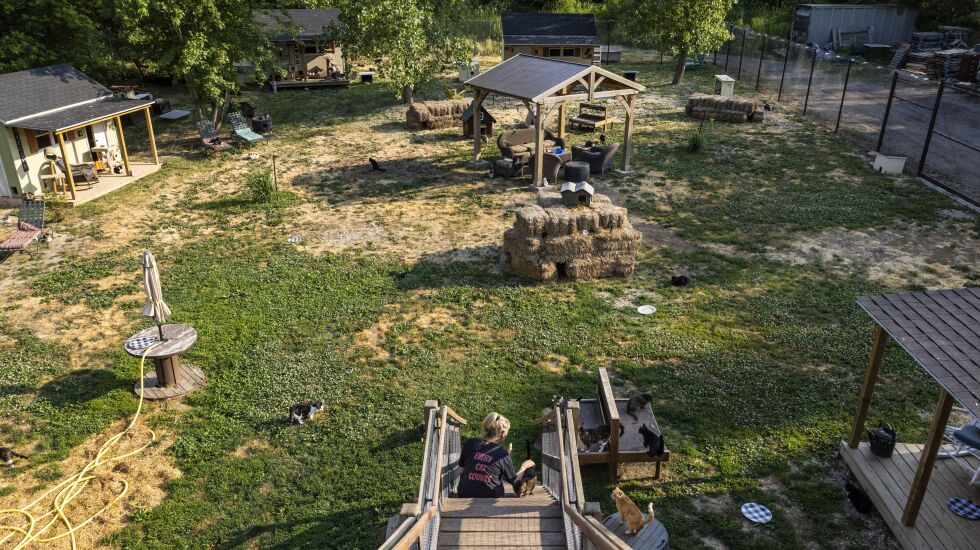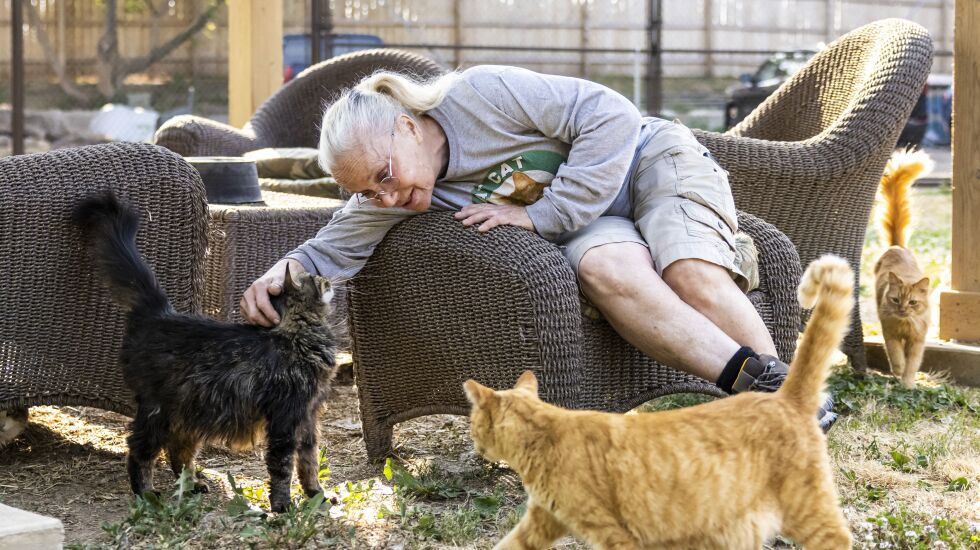
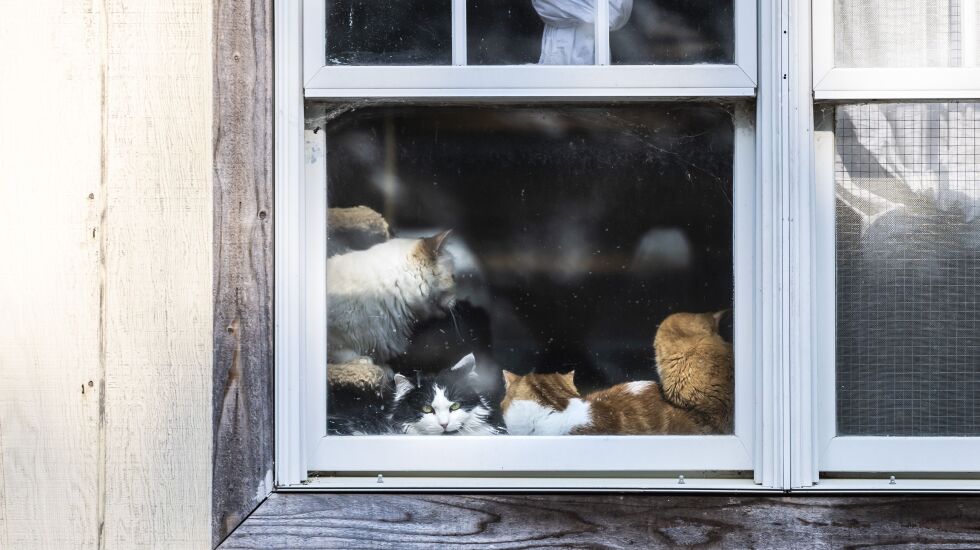
“Do you want to meet my husband?” asks Kaye Larsen Olloway, pausing from portioning out soft cat food on her flower bedecked patio to scoop up an off-white, 17-year-old cat and press him to her cheek. “This is Johnny Ringo. He’s so sweet. He has five other wives. We fight over him.”
Hard to know where to go with that information. Umm, named for the Beatle?
“You know why we named him that?” Olloway replies. “When you look at his tail, he has five orange rings on his tail.”
The naming of cats might have been a difficult matter for poet T.S. Eliot. But it’s just part of the daily routine at Fat Cat Rescue in Wadsworth, where hundreds of feral cats trapped on the street are taken to live in genteel comfort on a seven-acre farm, with a pond, a three-story antique barn and various quaint outbuildings decorated with cats in mind.
Outside, an electrified fence keeps predators away, while inside, many walls have wooden chairs, legs removed, strategically mounted so cats can leap up, get comfortable and observe life from a comfortable distance.
At 7:30 a.m. on a recent beautiful June morning, Olloway places cardboard troughs of food around the compound, keeping up a steady conversation.
“Hi, babies!” Olloway says. “What’s going on here, huh?”
The felines present themselves for scratches — they seem more interested in love than food — and are introduced: Sammy the Bull, Gracie Mae, who just got over an illness. Baby Blue, who is called, conversationally, Blue-Blue, or just Baby (“a cat must have three different names,” Eliot writes).
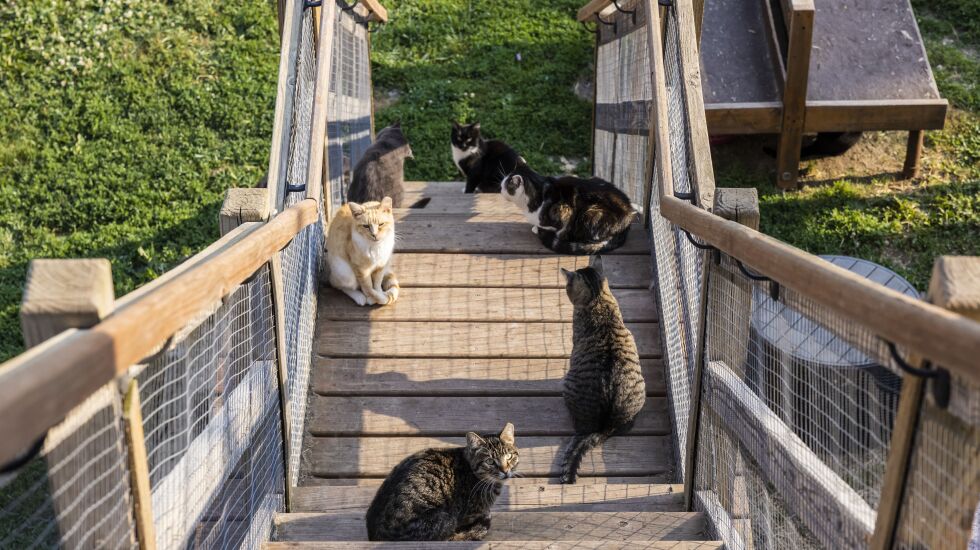
It doesn’t take a Nobel Prize in Literature to figure out where some names come from. Cotton is white; Midnight, black. “Dottie” is named for the white dot on her front paw, “Scout” has an inquisitive nature.
TV shows help when cats arrive in batches — Lucille, Desi, Ricardo. Others are named for streets where they’re found: Foster. Kennedy. A mother, Madison, has M-named babies.
There are mostly feral cats — born in the wild, only recently accustomed to humans, if at all. One volunteer places the number living at Fat Cat Rescue between 300 and 350. Still, they are a lucky few.
“Feral cat colonies are a fact of life in neighborhoods and areas throughout the county,” says Armando Tejeda, a spokesman for Chicago Animal Care and Control. “This is why the practice of TNR is so important. “
“TNR” is short for “Trap, neuter, return,” where feral cats are captured, sterilized and returned to where they were found. Neutering is necessary because of cats’ exponential reproductive math: A female cat can get pregnant at four months and gestation is a little over two months. Meaning one pregnant cat can, in theory, lead to 1 million-plus cats after a decade.
The “return” is necessary because of the cost of feeding and housing cats — money is a perpetual worry for Olloway. Though return also exposes feral cats to the troubles of the streets: disease, accidents, cruelty from humans. The average lifespan of a feral cat is three years.
At Fat Cat, residents can live 15. There is a catch — you can’t bring your unwanted cats there.
Just as Chicago Animal Care discourages people from dropping off feral cats — “We do run into misconceptions that all outside cats need to be taken to CACC,” Tejeda says — so Fat Cat isn’t for anybody trying to give away kittens.
It’s also not a place where you can just show up and adopt one. If you want to adopt, go to their website, fatcatrescueinc.org, and fill out a form first. Then, if you are deemed worthy, you’ll be invited to visit. Adopting costs from $50 to $155, depending on the cat’s age.
Anyone can, however, donate or purchase a way-cool shirt showing Whiskers, one of Olloway’s first rescues. Or volunteer. About 75 volunteers work at Fat Cat. For some, it’s nearly a full-time job.
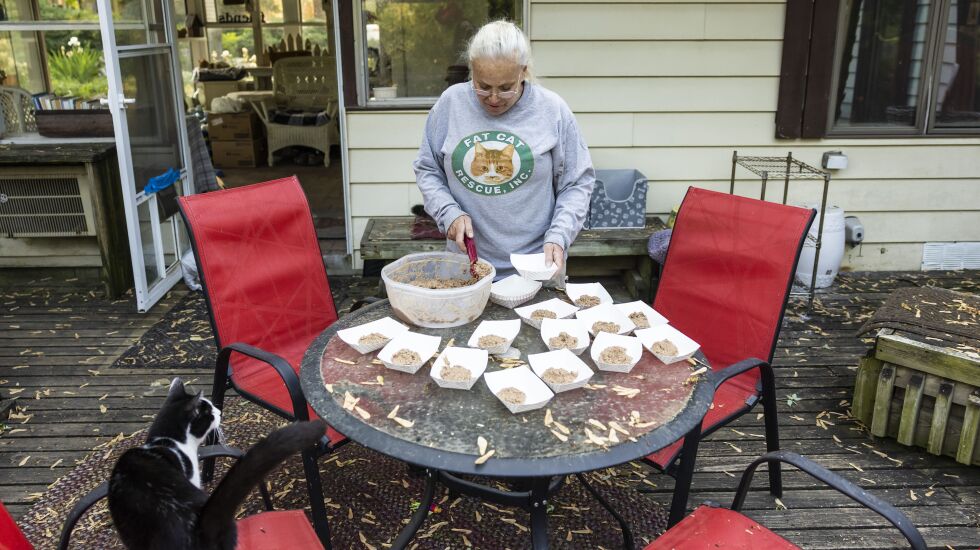
“We need people who will get into the nitty gritty, the dirty work,” says Bobbie Davis, the volunteer coordinator. “Cleaning litter boxes. Sweeping. Mopping. Sterilizing food and water bowls.”
Davis drives two hours a day to get here.
“I work at Mariano’s part time to pay for my habit,” she says. “I live in Downers Grove and drive 116 miles round-trip.”
Why?
“Because I believe in Fat Cat Rescue,” she replies. “People think I’m crazy because I could go to so many places that are closer. But they’re not feral rescues. This is. The cats are very laid back and relaxed. This is heaven. This is really heaven.”
“It’s like a family,” adds Dianne Robison. “I don’t think there’s any place like this.”
One recent night, Robison prepared the food Olloway is distributing, opening 90 to 100 small cans of Friskies Pate Poultry Platter and scooping them into a big container. Fat Cat runs through $5,000 a month worth of cat food and relies on donations. If tiny single serving cans are donated, then that’s what gets opened. She gives a tour.
“This is the barn,” says Robison.
The barn has three levels. The first floor is intake — for sick cats, or cats that have just come in.
“This floor we have segregated rooms. We want to give more socializing to them,” says Robison. “We want to keep them safe from the bullies and the hoodlums.”
There are nine litter boxes on the first floor of the barn; 21 on the second floor; 30 on the third. Yet nothing smells bad.
“When you say we’re in a barn, people don’t realize how nice it is,” says Linda Petersen, a friend whose excavating company helped ready the farm, which was piled with garbage and construction debris when purchased in late 2017. “I’m so proud of Kaye. She has great vision.”
Olloway, 65, was born in North Chicago, where her father had a trucking company. He, too, loved cats, and she began as a cat owner. Taking in strays was a gradual process. For a while, she had a contract with North Chicago to trap, neuter and return feral cats.
“A huge help controlling the feral cat population,” remembers Damian Leski, animal control officer for North Chicago. “They did a wonderful job.”
Some cats are too injured or ill to return, and that’s how Fat Cat got started. Olloway created a home for them, first at her house, then at her father’s company. The property is an ideal setting but a lot of work. Landscaping, for instance, is done by Olloway’s non-cat husband of 41 years, Sam, who initially took a dim view of his wife’s growing cat family.
“He said I was nuts,” remembers Kaye. Sam initially tried to put his foot down — only four cats allowed in the house.
“We had Kiki and Buddy — two flame tip Himalayans — Smoochie and Cry Baby, a Siamese,” he recalls.
At first.
But more cats came, and people would ask, “What’s wrong with your wife? Has she gone crazy?” He found himself defending his wife. “Just leave her alone,” he’d say.
Before he knew it, the four-cat limit was history, and he was doing maintenance for a seven-acre cat sanctuary.
“It snowballed,” he explains. “We had ’em at home. We had them at her mom’s garage.”
What happened to his initial resistance?
“As time goes on, you get attached to them,” says Sam, a Navy vet. “Especially if the kitties are nice and cuddle up against you. It’s kind of easy to get attached to kitties.”
